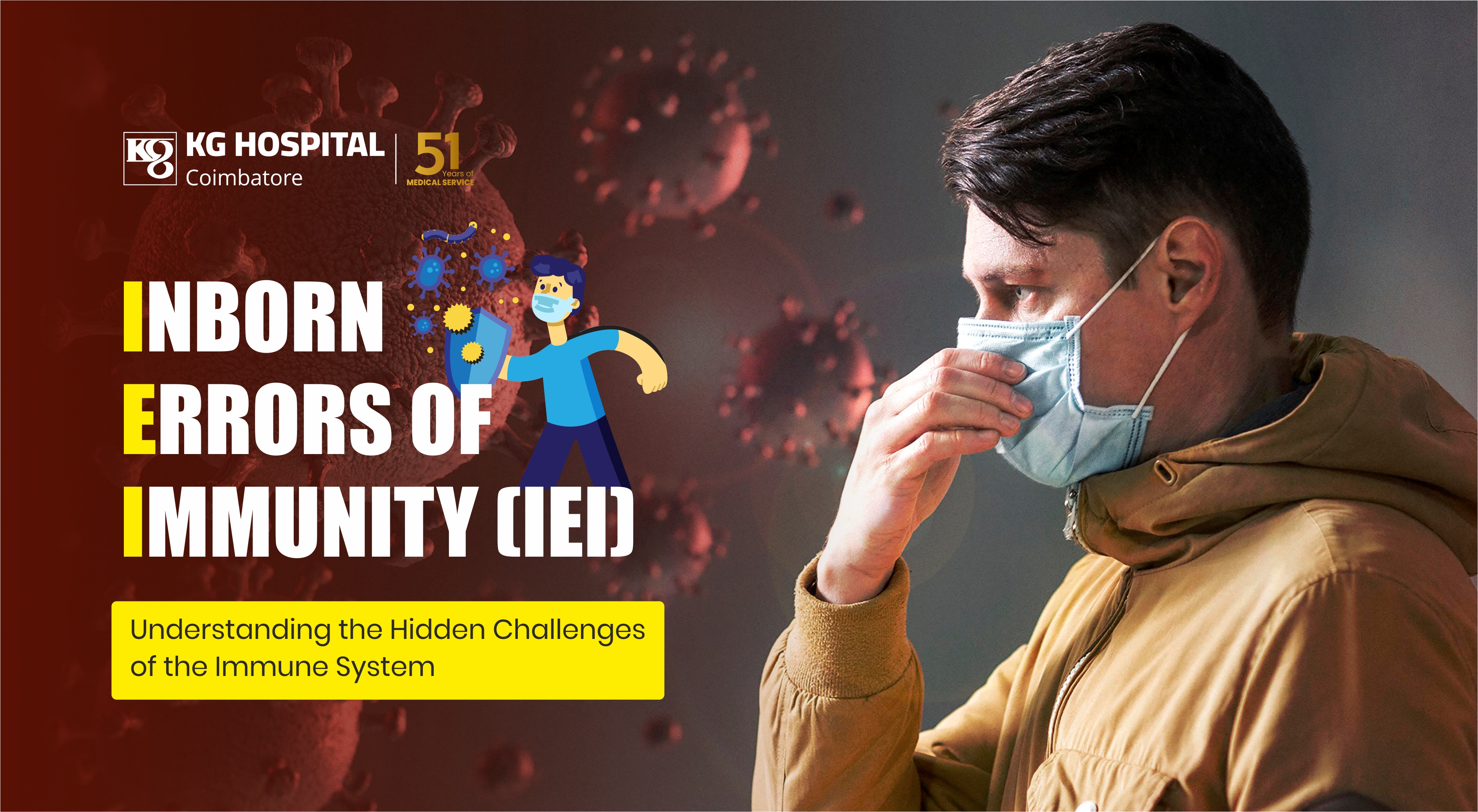Inborn Errors of Immunity (IEI): Understanding the Hidden Challenges of the Immune System

Inborn Errors of Immunity, or IEI, are a heterogeneous group of inherited disorders of the immune system. They may present as increased susceptibility to infections, autoimmunity, auto-inflammation, or malignancy. These conditions are not restricted to the paediatric age group, as many IEIs have adult onset.
An Immunologist is a specialist trained to diagnose these presumed rare diseases through specialized investigations and genetic tests to identify the underlying cause. Treatment is planned based on the pathophysiology driving the disease process.
The Immunology OPD is the first of its kind in Coimbatore and nearby towns, serving as a referral and diagnostic centre for immune-related disorders.

🧫 Causes and Genetic Basis of IEI
The root cause of IEI lies in genetic mutations that impair the body’s ability to produce or regulate immune cells and proteins. These mutations can be: Autosomal recessive, where both parents carry one defective gene copy. Autosomal dominant, where a single gene mutation causes disease. X-linked, affecting mostly males.
Over 500 distinct genetic defects have been identified so far, thanks to rapid advances in genomic sequencing. Some IEIs are due to newly arisen (de novo) mutations, meaning they can occur without a family history.
We Specialize in the Diagnosis and Management of:
- Severe Combined Immune Deficiency and Combined Immune Deficiency
- Disorders of Immune-dysregulation or Autoimmunity
- Benign and malignant lymphoproliferation with EBV signature
- Phagocytic defects, including Severe Congenital Neutropenia, Chronic Granulomatous Disease, and Leucocyte Adhesion Deficiency
- Mendelian Susceptibility to Mycobacterial Disease and susceptibility to specific infections such as vaccine-associated Measles, Herpes simplex encephalitis, and Chronic Mucocutaneous Candidiasis
- Autoinflammatory diseases
- Recurrent malignancy or family history of malignancy
In simple terms this table elicits very basic clinical feature that needs immunological evaluation of a patient
| Leading Signs in Children | Leading Signs in Adults |
|---|---|
| Cytopenias | Bronchiectasis |
| >2 systemic infections | Cytopenias |
| Recurrent fever | Autoimmune diseases |
| Bronchiectasis | >3 Pneumonias |
Mission
Our mission is to identify and treat the so-called “rare diseases”, as the term itself is a misnomer. Many of these diseases go unrecognized, unreported, and undiagnosed due to a lack of awareness among primary care providers.
Scope of Immunology Services
- Establishing facilities for the diagnosis and management of IEIs
- Raising awareness to reduce delays in referral and diagnosis
- Educating clinicians, pediatricians, and physicians through simple diagnostic algorithms for early recognition of suspected IEIs
- Establishing state-of-the-art flow cytometry-based diagnostic facilities for IEIs, allowing samples from Coimbatore and across Tamil Nadu to be processed locally—reducing dependence on external labs and improving turnaround time (TAT)
- Using small molecules in managing cytokinemia and cytokine storm, as seen in HLH, MAS, and Interferonopathies.
This will involve multiplex analysis systems for cytokine profiling by flow cytometry, also useful in post-HSCT monitoring.
For the General Public Seeking Immunology Consultation:
- Consult an immunologist if you or your child has:
- Loss of a child due to infection or disease of unknown cause
- Poor weight gain or developmental delay
- Recurrent infections requiring hospital admission (≥3 times a year)
- Recurrent sino-pulmonary infections, pneumonia, or bronchiectasis
- Chronic ear discharge
- Perianal abscess with fistula formation in a child
- Recurrent meningitis
- Life-threatening influenza
- Early-onset chronic diarrhoea or inflammatory bowel disease with other autoimmune features
- Difficult-to-treat tuberculosis or fungal infections
- Persistent skin or nail fungal infections (dermatophytosis)
- Recurrent varicella (chickenpox) or viral warts
- Recurrent or severe molluscum contagiosum
- Recurrent or significant neck swellings (local or generalized lymphadenopathy)
- Early-onset Type 1 diabetes, hypothyroidism, SLE, inflammatory bowel disease, or interstitial lung disease (as part of autoimmunity)
- Family history of autoimmune diseases
- Recurrent oral ulcers, skin rash, arthritis, non-healing ulcers, or unexplained fever
- High IgE with atopic dermatitis associated with infections or autoimmunity
- Pancytopenia (low counts of all blood cells) or repeated hemoglobin drops requiring steroids or blood transfusion
- Family history or recurrence of cancer, or occurrence of cancer at an unusual age or site